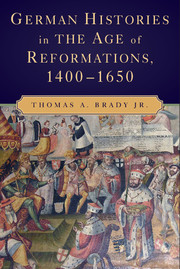Book contents
- Frontmatter
- Contents
- Figures, Maps, and Tables
- Acknowledgments
- A Note on Usages
- Map 1 The Empire in 1547
- Map 2 The Peace of Westphalia, 1648
- Part I The Empire, the German Lands, and Their Peoples
- Part II Reform of the Empire and the Church, 1400–1520
- Part III Church, Reformations, and Empire, 1520–1576
- 9 Urban Reformations
- 10 A Revolution of the Common Man
- 11 Imperial Reformations in the Age of Charles V
- 12 Imperial Peace, 1555–1580
- Part IV Confessions, Empire, and War, 1576–1650
- Appendix
- Glossary
- Bibliography
- Index
12 - Imperial Peace, 1555–1580
Published online by Cambridge University Press: 05 June 2012
- Frontmatter
- Contents
- Figures, Maps, and Tables
- Acknowledgments
- A Note on Usages
- Map 1 The Empire in 1547
- Map 2 The Peace of Westphalia, 1648
- Part I The Empire, the German Lands, and Their Peoples
- Part II Reform of the Empire and the Church, 1400–1520
- Part III Church, Reformations, and Empire, 1520–1576
- 9 Urban Reformations
- 10 A Revolution of the Common Man
- 11 Imperial Reformations in the Age of Charles V
- 12 Imperial Peace, 1555–1580
- Part IV Confessions, Empire, and War, 1576–1650
- Appendix
- Glossary
- Bibliography
- Index
Summary
It's a maxim not to be despised, “Though peace be made, yet it's interest that keeps peace.”
Oliver CromwellAt fifty-six, Charles V was spent in spirit and body. On 25 October 1556, one hand on a crutch and the other on the broad shoulder of Prince William of Orange-Nassau (1533–84), he stood before the Netherlandish notables, knights of the Golden Fleece, and members of his own family in the great hall of the palace at Brussels. After a reading of his formal declaration of intent to abdicate in favor of his son, Prince Philip, Charles himself began to speak. He reminisced about his youth in these beloved Low Countries and spoke of the purpose that had gripped his life during these past forty years. “I sought the Imperial office,” he said, “from a desire not to rule over other kingdoms, but to watch over Germany, my dear fatherland, and my other realms, especially those of Flanders, as well as over the peace and unity of Christendom. I have gathered all my forces and all my lands to strengthen the Christian religion against the Turks.” Yet “because of the difficulties and confusions created partly by the heresies of Luther and other heretical innovators in Germany and partly by neighboring princes and others who … embroiled me in perilous wars, I have not attained these goals to the degree that I have always desired.” Therefore, “I have come to the irrevocable decision to give up all my lands.
- Type
- Chapter
- Information
- German Histories in the Age of Reformations, 1400–1650 , pp. 229 - 256Publisher: Cambridge University PressPrint publication year: 2009

